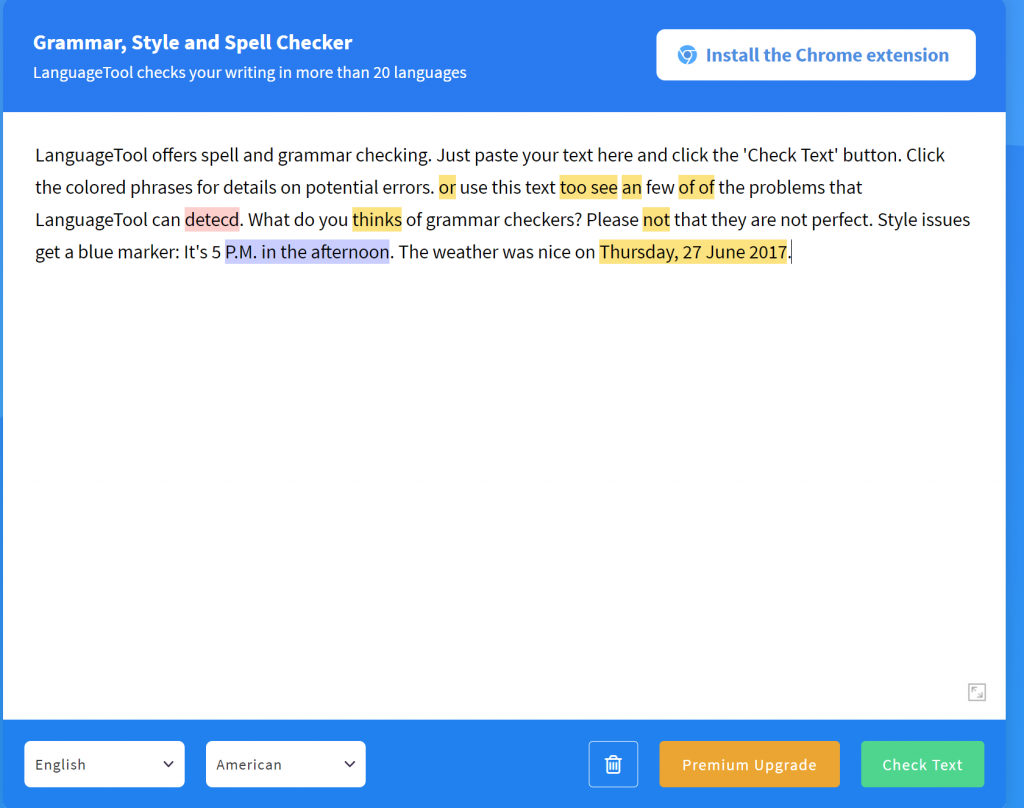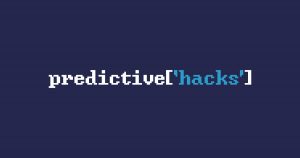LanguageTool
LanguageTool is an open-source grammar tool, also known as the spellchecker for OpenOffice. This library allows you to detect grammar errors and spelling mistakes through a Python script or through a command-line interface. We will work with the language_tool_pyton python package which can be installed with the pip install language-tool-python command. By default, language_tool_python will download a LanguageTool server .jar and run that in the background to detect grammar errors locally. However, LanguageTool also offers a Public HTTP Proofreading API that is supported as well but there is a restriction in the number of calls.
LanguageTool in Python
We will provide a practical example of how you can detect your grammar mistakes and also correct them. We will work with the following text:
” LanguageTool offers spell and grammar checking. Just paste your text here and click the ‘Check Text’ button. Click the colored phrases for details on potential errors. or use this text too see an few of of the problems that LanguageTool can detecd. What do you thinks of grammar checkers? Please not that they are not perfect. Style issues get a blue marker: It’s 5 P.M. in the afternoon. The weather was nice on Thursday, 27 June 2017“.
I made bold the grammar issues. Let’s see how we can detect them with Python:
import language_tool_python
tool = language_tool_python.LanguageTool('en-US')
text = """LanguageTool offers spell and grammar checking. Just paste your text here and click the 'Check Text' button. Click the colored phrases for details on potential errors. or use this text too see an few of of the problems that LanguageTool can detecd. What do you thinks of grammar checkers? Please not that they are not perfect. Style issues get a blue marker: It's 5 P.M. in the afternoon. The weather was nice on Thursday, 27 June 2017"""
# get the matches
matches = tool.check(text)
matches
[Match({'ruleId': 'UPPERCASE_SENTENCE_START', 'message': 'This sentence does not start with an uppercase letter', 'replacements': ['Or'], 'context': '...hrases for details on potential errors. or use this text too see an few of of the ...', 'offset': 168, 'errorLength': 2, 'category': 'CASING', 'ruleIssueType': 'typographical'}),
Match({'ruleId': 'TOO_TO', 'message': 'Did you mean "to see"?', 'replacements': ['to see'], 'context': '...s on potential errors. or use this text too see an few of of the problems that Language...', 'offset': 185, 'errorLength': 7, 'category': 'CONFUSED_WORDS', 'ruleIssueType': 'misspelling'}),
Match({'ruleId': 'EN_A_VS_AN', 'message': 'Use "a" instead of \'an\' if the following word doesn\'t start with a vowel sound, e.g. \'a sentence\', \'a university\'', 'replacements': ['a'], 'context': '...ential errors. or use this text too see an few of of the problems that LanguageToo...', 'offset': 193, 'errorLength': 2, 'category': 'MISC', 'ruleIssueType': 'misspelling'}),
Match({'ruleId': 'ENGLISH_WORD_REPEAT_RULE', 'message': 'Possible typo: you repeated a word', 'replacements': ['of'], 'context': '...errors. or use this text too see an few of of the problems that LanguageTool can dete...', 'offset': 200, 'errorLength': 5, 'category': 'MISC', 'ruleIssueType': 'duplication'}),
Match({'ruleId': 'MORFOLOGIK_RULE_EN_US', 'message': 'Possible spelling mistake found.', 'replacements': ['detect'], 'context': '...f of the problems that LanguageTool can detecd. What do you thinks of grammar checkers...', 'offset': 241, 'errorLength': 6, 'category': 'TYPOS', 'ruleIssueType': 'misspelling'}),
Match({'ruleId': 'DO_VBZ', 'message': 'After the auxiliary verb \'do\', use the base form of the main verb. Did you mean "think"?', 'replacements': ['think'], 'context': '...at LanguageTool can detecd. What do you thinks of grammar checkers? Please not that th...', 'offset': 261, 'errorLength': 6, 'category': 'GRAMMAR', 'ruleIssueType': 'grammar'}),
Match({'ruleId': 'PLEASE_NOT_THAT', 'message': 'Did you mean "note"?', 'replacements': ['note'], 'context': '... you thinks of grammar checkers? Please not that they are not perfect. Style issues...', 'offset': 296, 'errorLength': 3, 'category': 'TYPOS', 'ruleIssueType': 'misspelling'}),
Match({'ruleId': 'PM_IN_THE_EVENING', 'message': 'This is redundant. Consider using "P.M."', 'replacements': ['P.M.'], 'context': "... Style issues get a blue marker: It's 5 P.M. in the afternoon. The weather was nice on Thursday, 27 Ju...", 'offset': 366, 'errorLength': 22, 'category': 'REDUNDANCY', 'ruleIssueType': 'style'}),
Match({'ruleId': 'DATE_WEEKDAY', 'message': 'The date 27 June 2017 is not a Thursday, but a Tuesday.', 'replacements': [], 'context': '... the afternoon. The weather was nice on Thursday, 27 June 2017', 'offset': 413, 'errorLength': 22, 'category': 'SEMANTICS', 'ruleIssueType': 'inconsistency'})]As we can see we get a detailed dictionary that shows the ruleId, the message etc. You can find a detailed explanation of every rule id in the LanguageTool Community. It is interesting to see the error that it captured about the date where it returns a message that: The date 27 June 2017 is not a Thursday, but a Tuesday. However, for this case, it does not have a correction because it cannot guess what did the author mean by entering this date 🙂
Since we detect the mistakes now we can correct them.
my_mistakes = []
my_corrections = []
start_positions = []
end_positions = []
for rules in matches:
if len(rules.replacements)>0:
start_positions.append(rules.offset)
end_positions.append(rules.errorLength+rules.offset)
my_mistakes.append(text[rules.offset:rules.errorLength+rules.offset])
my_corrections.append(rules.replacements[0])
my_new_text = list(text)
for m in range(len(start_positions)):
for i in range(len(text)):
my_new_text[start_positions[m]] = my_corrections[m]
if (i>start_positions[m] and i<end_positions[m]):
my_new_text[i]=""
my_new_text = "".join(my_new_text)
my_new_text
And we get:
“LanguageTool offers spell and grammar checking. Just paste your text here and click the ‘Check Text’ button. Click the colored phrases for details on potential errors. Or use this text to see a few of the problems that LanguageTool can detect. What do you think of grammar checkers? Please note that they are not perfect. Style issues get a blue marker: It’s 5 P.M. The weather was nice on Thursday, 27 June 2017“
Spelling and Grammar Mistakes
Let’s see the mistakes that we captured and their corresponding corrections.
list(zip(my_mistakes,my_corrections))
[('or', 'Or'),
('too see', 'to see'),
('an', 'a'),
('of of', 'of'),
('detecd', 'detect'),
('thinks', 'think'),
('not', 'note'),
('P.M. in the afternoon.', 'P.M.')]Detailed Example
We will provide a detailed example by taking into consideration a simple example of just one sentence and we will have a look at the output we get from the LanguageTool. Our sentence:
“Your the best but their are allso good!“
text = "Your the best but their are allso good !" matches = tool.check(text) len(matches) # 4
The LanguageTool detected 4 issues. We can focus on each issue. Let’s have a look.
matches[0]
And we get:
Match({'ruleId': 'YOUR_YOU_RE', 'message': 'Did you mean "You\'re"?', 'replacements': ["You're"], 'context': 'Your the best but their are allso good !', 'offset': 0, 'errorLength': 4, 'category': 'TYPOS', 'ruleIssueType': 'misspelling'})As we can see it mentions the ruleId, a message to the end user which is “Did you mean “You’re“, the suggested replacements, the context which is the input, the offset which is the position of the start of the issue, the errorLength which is the number of characters of the issue, in our case 4 characters, the category of the mistake which is “TYPOS” in our case and the releIssueType which is “misspelling”.
We can show how we can call each element of the language_tool_python.match.Match type with the name followed by a period. Let’s say that we want to call the replacements.
matches[0].replacements # ["You're"]
Let’s have a look at the other issues detected by LanguageTool. The second detected issue was the “their” which is corrected to there
matches[1]
And we get:
Match({'ruleId': 'THEIR_IS', 'message': 'Did you mean "there"?', 'replacements': ['there'], 'context': 'Your the best but their are allso good !', 'offset': 18, 'errorLength': 5, 'category': 'CONFUSED_WORDS', 'ruleIssueType': 'misspelling'})The third detected issue was the “allso” which is corrected to also
matches[2]
And we get:
Match({'ruleId': 'MORFOLOGIK_RULE_EN_US', 'message': 'Possible spelling mistake found.', 'replacements': ['also', 'all so'], 'context': 'Your the best but their are allso good !', 'offset': 28, 'errorLength': 5, 'category': 'TYPOS', 'ruleIssueType': 'misspelling'})Finally, the last detected issue was the double spaces which is corrected to a single space.
matches[3]
And we get:
Match({'ruleId': 'WHITESPACE_RULE', 'message': 'Possible typo: you repeated a whitespace', 'replacements': [' '], 'context': 'Your the best but their are allso good!', 'offset': 33, 'errorLength': 2, 'category': 'TYPOGRAPHY', 'ruleIssueType': 'whitespace'})Automatically apply suggestions to the text
We can apply suggestions to the text automatically as follows:
import language_tool_python
tool = language_tool_python.LanguageTool('en-US')
text = 'A sentence with a error in the Hitchhiker’s Guide tot he Galaxy'
tool.correct(text)
'A sentence with an error in the Hitchhiker’s Guide to the Galaxy'Discussion
If we want a free tool in Python that does similar work with Grammarly and supports more than 20 languages, then the LanguageTool is a good option. Of course, none tool is perfect and we cannot rely solely on grammar and spell checkers but for sure is something that we can use mainly in NLP tasks and projects.
More Data Science Hacks?
You can follow us on Medium for more Data Science Hacks




